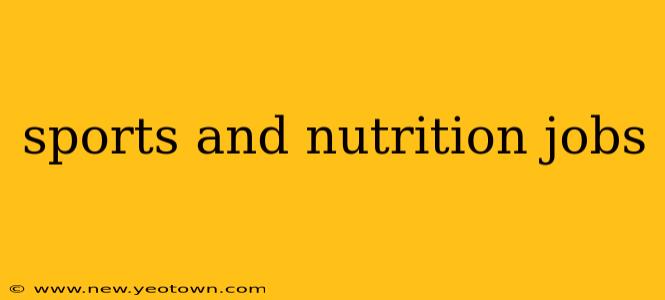The intersection of sports and nutrition is a dynamic and rewarding field, offering a diverse range of career paths for those passionate about athletic performance and healthy living. From elite athletes to everyday fitness enthusiasts, the demand for skilled sports nutrition professionals is constantly growing. But what exactly does a career in this field entail? Let's delve into the exciting world of sports and nutrition jobs.
What are the different types of sports and nutrition jobs?
The world of sports nutrition offers a surprising variety of career paths. You're not limited to working directly with athletes. Here are some examples:
-
Registered Dietitian (RD) specializing in Sports Nutrition: This is a common and highly sought-after role. RDs with specialized training in sports nutrition work with athletes of all levels, designing personalized nutrition plans to optimize performance, recovery, and overall health. They may work with individual athletes, teams, or even organizations.
-
Certified Sports Nutritionist (CSSD or other certifications): While the "Registered Dietitian" title holds a high level of professional recognition and legal protection in many areas, various certifications exist that demonstrate expertise in sports nutrition. These professionals can work in similar capacities to RDs, but their scope of practice may differ depending on the specific certification and jurisdiction.
-
Strength and Conditioning Coach with Nutrition Expertise: Many strength and conditioning coaches incorporate nutritional guidance into their training programs. This often involves working closely with athletes to ensure proper fueling strategies for workouts and recovery.
-
Personal Trainer with a Focus on Nutrition: Personal trainers who understand nutrition can provide holistic fitness plans that incorporate both exercise and diet. This is a great entry-level path for those passionate about both areas.
-
Sports Nutrition Researcher: For those with a scientific bent, research positions in sports nutrition are available in universities, research institutions, and even sports organizations. These roles often involve conducting studies on nutritional strategies and their effects on athletic performance.
-
Nutrition Consultant for Sports Teams or Organizations: Professional sports teams and fitness organizations often employ sports nutrition consultants to oversee the nutritional needs of their athletes or members. This involves planning team meals, educating athletes about nutrition, and monitoring their progress.
What education and certifications are needed for sports and nutrition jobs?
The required education and certifications vary depending on the specific job and your desired career path.
-
Registered Dietitian (RD): Requires a minimum of a bachelor's degree in dietetics or a related field, followed by supervised practice and passing a national exam.
-
Certified Sports Nutritionist: Various certifications are available, each with its own requirements. Some may only require a bachelor's degree and passing an exam, while others may require more extensive education and experience. It's essential to thoroughly research specific certifications to understand their prerequisites and scope of practice.
-
Strength and Conditioning Coach: Often requires a bachelor's degree in exercise science or a related field, along with certifications such as CSCS (Certified Strength and Conditioning Specialist).
-
Personal Trainer: Typically requires a certification from a reputable organization, often along with continuing education courses.
What skills are essential for a career in sports and nutrition?
Beyond the formal education and certifications, certain skills are crucial for success in this field:
- Strong communication skills: Effectively communicating complex nutritional information to athletes of varying backgrounds is vital.
- Analytical skills: Analyzing an athlete's performance, dietary habits, and training regimen to develop a tailored nutrition plan requires analytical abilities.
- Problem-solving skills: Adapting nutrition plans to meet unforeseen challenges and individual needs is essential.
- Interpersonal skills: Building rapport with athletes and creating a collaborative environment is crucial for success.
- Organization and time management: Balancing multiple clients or projects often necessitates strong organizational skills.
How much do sports and nutrition jobs pay?
Salaries vary widely depending on experience, location, and the specific role. Entry-level positions may offer lower salaries, while experienced professionals in high-demand areas can earn significantly more. Researching salary ranges in your area for specific roles is advisable.
What is the job outlook for sports and nutrition careers?
The job outlook for sports and nutrition professionals is positive. As awareness of the importance of nutrition in athletic performance grows, the demand for skilled professionals in this area is expected to continue rising.
This exploration of the world of sports and nutrition jobs provides a starting point for anyone interested in pursuing a career in this exciting and impactful field. Remember to research specific job requirements and certifications to chart the best path to success.

